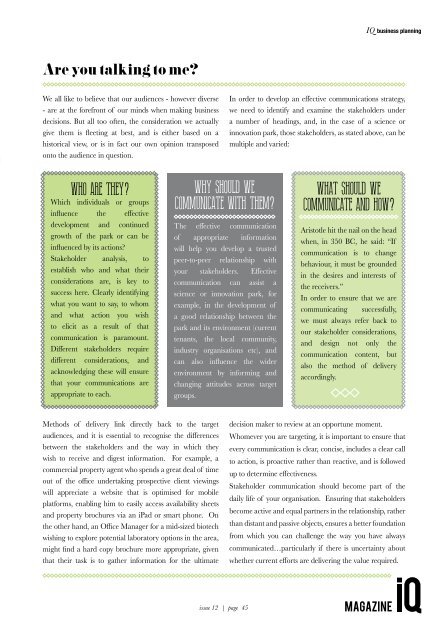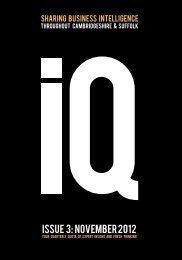IQ-Magazine-Issue-12
Create successful ePaper yourself
Turn your PDF publications into a flip-book with our unique Google optimized e-Paper software.
<strong>IQ</strong> business planning<br />
Are you talking to me?<br />
We all like to believe that our audiences - however diverse<br />
- are at the forefront of our minds when making business<br />
decisions. But all too often, the consideration we actually<br />
give them is fleeting at best, and is either based on a<br />
historical view, or is in fact our own opinion transposed<br />
onto the audience in question.<br />
In order to develop an effective communications strategy,<br />
we need to identify and examine the stakeholders under<br />
a number of headings, and, in the case of a science or<br />
innovation park, those stakeholders, as stated above, can be<br />
multiple and varied:<br />
Who are they?<br />
Which individuals or groups<br />
influence the effective<br />
development and continued<br />
growth of the park or can be<br />
influenced by its actions?<br />
Stakeholder analysis, to<br />
establish who and what their<br />
considerations are, is key to<br />
success here. Clearly identifying<br />
what you want to say, to whom<br />
and what action you wish<br />
to elicit as a result of that<br />
communication is paramount.<br />
Different stakeholders require<br />
different considerations, and<br />
acknowledging these will ensure<br />
that your communications are<br />
appropriate to each.<br />
Why should we<br />
communicate with them?<br />
The effective communication<br />
of appropriate information<br />
will help you develop a trusted<br />
peer-to-peer relationship with<br />
your stakeholders. Effective<br />
communication can assist a<br />
science or innovation park, for<br />
example, in the development of<br />
a good relationship between the<br />
park and its environment (current<br />
tenants, the local community,<br />
industry organisations etc), and<br />
can also influence the wider<br />
environment by informing and<br />
changing attitudes across target<br />
groups.<br />
What should we<br />
communicate and how?<br />
Aristotle hit the nail on the head<br />
when, in 350 BC, he said: “If<br />
communication is to change<br />
behaviour, it must be grounded<br />
in the desires and interests of<br />
the receivers.”<br />
In order to ensure that we are<br />
communicating successfully,<br />
we must always refer back to<br />
our stakeholder considerations,<br />
and design not only the<br />
communication content, but<br />
also the method of delivery<br />
accordingly.<br />
Methods of delivery link directly back to the target<br />
audiences, and it is essential to recognise the differences<br />
between the stakeholders and the way in which they<br />
wish to receive and digest information. For example, a<br />
commercial property agent who spends a great deal of time<br />
out of the office undertaking prospective client viewings<br />
will appreciate a website that is optimised for mobile<br />
platforms, enabling him to easily access availability sheets<br />
and property brochures via an iPad or smart phone. On<br />
the other hand, an Office Manager for a mid-sized biotech<br />
wishing to explore potential laboratory options in the area,<br />
might find a hard copy brochure more appropriate, given<br />
that their task is to gather information for the ultimate<br />
decision maker to review at an opportune moment.<br />
Whomever you are targeting, it is important to ensure that<br />
every communication is clear, concise, includes a clear call<br />
to action, is proactive rather than reactive, and is followed<br />
up to determine effectiveness.<br />
Stakeholder communication should become part of the<br />
daily life of your organisation. Ensuring that stakeholders<br />
become active and equal partners in the relationship, rather<br />
than distant and passive objects, ensures a better foundation<br />
from which you can challenge the way you have always<br />
communicated…particularly if there is uncertainty about<br />
whether current efforts are delivering the value required.<br />
issue <strong>12</strong> | page 45

















